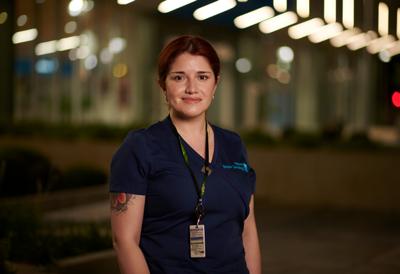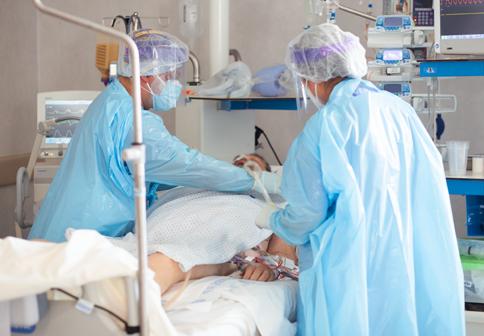
5 minute read
The hardest winter in Madrid
I knew what was likely to One day my grandfather, Osvaldo, who is happen next in technical 88 years old, started to have sleeping problems terms, but I was his and didn’t feel well. He had a chronic lung problem, and a medical team came to see him granddaughter and I didn’t at his home. The diagnosis was pneumonia. want him to die. Inside me, I Because of the pandemic and his symptoms, the whole family had to have a pcr test. The was hoping for a miracle. next day we got the news: the test was positive for Covid. He had been out to collect his pension a few days earlier. The trip out was only about half an hour, but it was enough to infect everyone. The week of 20 May, my grandfather Osvaldo was very ill and my family knew they had to do something, because he was too unwell to stay at home. I decided to take him to the clinic where I worked and where I have colleagues. Where would he get the best care? It was a really difficult week for the country because there weren’t enough beds and we were at the peak of the infections, and they were setting up ICU beds in the emergency unit. I had never seen people sitting on seats outside a hospital before. We had to find more spaces for
SANTIAGO — CHILE
more patients, because we had to move them from the emergency unit. At first, my grandfather had to wait at the hospital, where he had been taken urgently, for an intensive care bed. He was always very aware and never got confused. He knew very well where he was and what worried him the most was that he might not be allowed home. He said to me: Take me home, I don’t want to be here. I told him: Tata, I can’t take you home - I would if I could. I knew what was likely to happen next in technical terms, but I was his granddaughter and I didn’t want him to die. I was hoping for a miracle. It was very sad because normally, as a nurse, I would be giving hope to the families, but this time I was both a nurse and a family member. I talked to the medical team about treatment options, which I then passed on to my family – my mother and her brothers – who had always trusted me. Things started to get worse, and he needed oxygen and became distressed. That was the second last day I saw him. One of the doctors told me that there was the chance to move him to the intensive care unit to put him on mechanical, non-invasive ventilation, which would help him to breathe but wasn’t like intubation. There was nothing else for it, because he had severe pneumonia and an underlying lung disease that was hardly letting him breathe. He died the next day. My grandfather, Osvaldo, was like a father to me. He and my grandmother, Edelmira (even though everyone calls her Rosa) brought me up for 20 years. So his death was very painful to me. I am consoled by the thought that I really made the most of them both. My grandmother, who had Alzheimer’s, was always asking me: You took Osvaldo away, when are you bringing him back? She must have felt like a part of her had gone with him. They had 70 years together and I know they were very happy. I am happy I had the chance to say goodbye to him, and he was happy to have someone he knew by his side. He was not alone. I wanted to be a paediatric nurse, but life brought me adult patients. If that hadn’t happened, I probably wouldn’t have been able to be at my grandfather’s side. I feel I was able to bring dignity into his last days. I am happy he could slip away peacefully with his hand in mine. Then I got sick myself. But that’s another story. �
We care for each patient, as if they were the only one
adolfo vásquez Nurse Bupa Reñaca Hospital
I started working at the hospital last year, before the pandemic started. I was asked to cover the medical and surgery wards, where we care for patients who have been hospitalised and are Covid positive. They had no symptoms, no serious respiratory problems and were stable. By our ratings, they were medium level of difficulty.
The patients were totally isolated. The only chance they had to see us was when they talked to someone from the clinical team, which was usually the nurse who went in to do exams or give medicine. Many patients felt like having conversation and talked to us about their lives; they had not seen their families for one or two weeks. You would grow close to them and those were special times on our shifts.
What was not so good was when you would arrive, for example, at room 405, where a patient that you had been caring for all week had been , and they were no longer there. You would ask: Oh, what happened to that patient? They had been transferred to intermediate because they had got worse. Then you would ask intermediate and they had gone to icu and next thing you knew they had passed away.
At those times, we would think of our patients who had passed away and had children. I am from Villa Alemana and REÑACA — CHILE

I have two children. When I got home, I would act as if I had the virus, which was a good thing in terms of being careful, but at the same time I really just wanted to get home, rest and hug my children.
I think I chose a good profession and I think healthcare workers really have a generous spirit. Everyone who works in health - because you get cleaning people, service assistants, paramedics, nurses and doctors, all working with Covid patients. They are all really professional and caring, looking after each person as an individual. If the person is in pain, they are there, if they deteriorate, they quickly check up on them.
Even though there are lots of patients, each one is treated as if they were the only one. Each time one of them is discharged we are happy and it lifts our spirits - we know we have done well and saved a life. �










